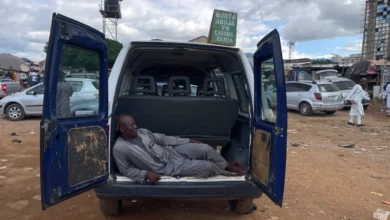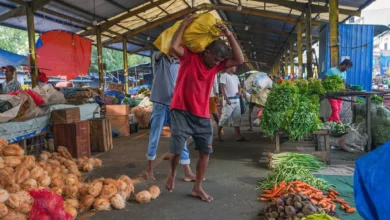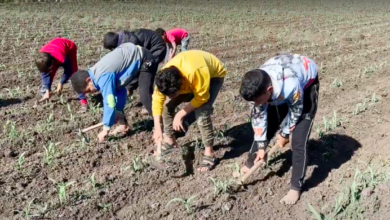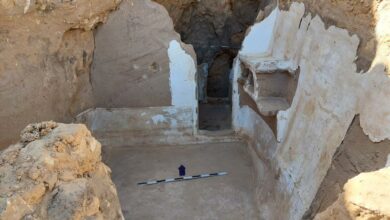Assiut–Residents of Rifa village on the outskirts of Assiut rely on seasonal harvests of crops for their income. The inconsistency of the seasonal harvest has them caught in a permanent state of poverty. Like countless others across Egypt, they depend on government subsidies to survive. For now, many barely get by. But potential changes to the subsidy system could have a major impact on lives in Rifa.
The battle against the cycle of extreme poverty in Egypt is an ongoing challenge. While government officials and academics seek solutions, around 40 percent of Egyptians continue to live at or below the international poverty line of US$2 per day Now, an ambitious new project has emerged: The Ministry of Social Solidarity, with assistance from a team of American University in Cairo researchers, plans to introduce Conditional Cash Transfers (CCT) to Egypt, a type of welfare program that makes subsidy payments conditional on certain behaviors.
CCT welfare programs, first attempted in Latin America in the early 1990s, aim to reduce long-term poverty through subsidy programs that are conditional upon receivers’ actions–such as sending children to school and regularly visiting doctors. Over 30 countries, including Mexico, Mozambique, Yemen, Morocco and Bangladesh, have some kind of CCT program.
Egypt’s subsidy programs have long been viewed as ineffective, with critics–and the government itself–readily acknowledging problems. Last February, Prime Minister Ahmed Nazif admitted at a press conference that because of corruption, subsidies benefit the rich rather than the poor.
“A single cylinder of butane gas costs the government LE50, but is sold to the public for only LE5,” Nazif said. “Cylinders are often leaked onto the black market, however, where they are sold to rich factory owners.”
Lenka Benova, a researcher at the American University in Cairo’s Social Research Center, which is consulting with the social solidarity ministry on the CCT program, agrees that anyone can benefit under the current subsidy system. Lack of monitoring, she says, means citizens who don’t need food tickets or cash transfers can still easily get their hands on them.
“The CCT program will ensure that those who most need assistance actually receive it,” Benova says.
The two-year CCT pilot program, Menhet el-Ossra, roughly translated as “family stipends,” aims to evaluate success across 65 villages in the governorates of Assiut and Sohag. On 2 May, the Ministry of Social Solidarity opened up the application process to residents of select villages and for the last three weeks dozens have lined up at local centers to apply for the new CCT program, which promises a monthly sum of LE244–on condition that their children remain in school and visit the doctor regularly.
“The ultimate goal is to stop the inter-generational transfer of poverty,” says Benova. “The premise is that poor households produce more poor households. CCTs aim to end that.”
Eligibility is simple: Anyone poor, with one or more children under 18 can apply. The SRC has so far collected thousands of applications across both governorates. Their applications are being reviewed for eligibility.
Eligible applicants will be selected to participate in the new program along with residents of similar socio-economic status in other Assiut and Sohag villages, but remaining under the traditional subsidy program, to serve as a control group. Results will be compared at the end of the two-year pilot program.
“It’s basically an experiment,” says Benova. “The idea is to evaluate success after two years, and then make the program national.”
The project has been months in the making. SRC representatives were dispatched to local villages to train social workers on the new program, according to Mohamed Hosni, field and training officer at the SRC.
“We’ve been training social workers across participating villages, to ensure they fully understand the new CCT protocol and can explain its conditions to the residents in their districts,” he says, adding that illiteracy is high in such areas.
Payment transfers will be wired to bank accounts belonging to the female heads of participating households. The first installments are scheduled for September. Subsidies will come from the Ministry of Social Solidarity’s budget, with the SRC funding the research.
The program’s focus is on education and health, two critical factors in the transfer of poverty.
“Every third child in Upper Egypt is stunted,” says Benova. “Preventative health care is not something people seek out. But health services exist within the Ministry of Health, so we are engaging citizens. They need to be healthy to be able to focus in school–and education is a determining factor for predicting people’s socio-economic future.”
Once the cash transfers begin, social workers will be dispatched each month to ensure recipients adhere to the conditions outlined in their “contract.” They will also monitor progress.
According to the SCA representatives, current government subsidy programs are not properly monitored, with social workers often lacking the will to meet with families and follow up on progress. To combat this, the CCT program will offer bonuses to social workers as incentives.
The Ministry of Education will assist by issuing permission for social workers to verify school registers to ensure that children from participating families are attending class.
While the government and academia work behind their desks, the residents of Rifa village, where children make up 40 percent of the population, are mostly skeptical that any real change will come their way.
“You cannot imagine the poverty here,” says one 47-year-old resident, whose total monthly income for himself his wife and five children is LE420.
He points out that four out of five are already in school. “To afford it, we establish gameyas in our village,” he says, referring to informal rotating credit associations traditional in Egypt.
A group of villagers take turns to candidly describe their living conditions.
“We can barely fill our children’s stomachs,” one says. “After harvest, the kids run off to collect fallen wheat from the farmlands for their mothers to cook. The land is not fertile. We just thank God for being in good health. It’s the only thing that’s free that we have to be grateful for.”
When asked if he thinks CCTs can help break the cycle of poverty, one villager shakes his head. “Those that are up, stay up. And those that are down, stay down. It is what it is.”
The others nod in agreement.
EgyptFeatures/Interviews




